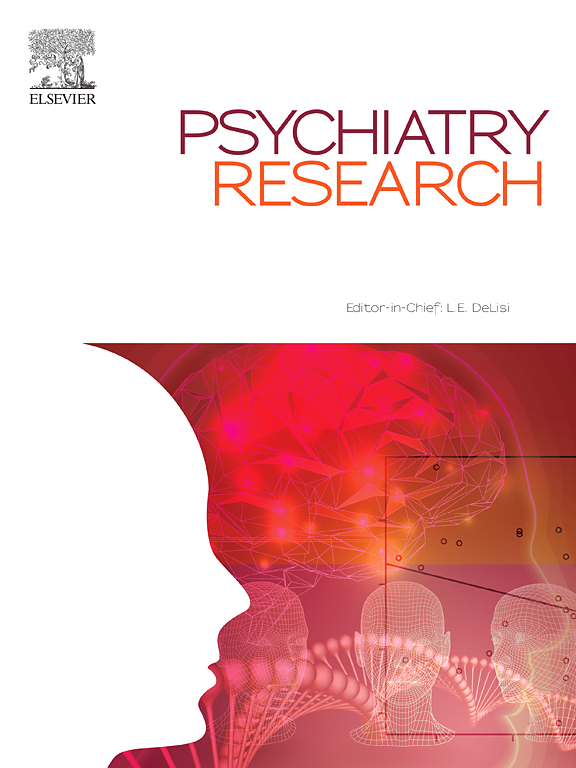Management of somatic comorbidities in psychiatric emergencies: Insights from a real-world cohort study
IF 3.9
2区 医学
Q1 PSYCHIATRY
引用次数: 0
Abstract
Background
The presence of somatic comorbidities alongside psychiatric emergencies (PEs) has a significant impact on treatment and prognosis. While there is evidence for benefits of psychiatric consultation services on diverse patient-specific outcome parameters, the role of internal medicine consultations in psychiatry, particularly in emergency departments (EDs), remains understudied.
Methods
This retrospective cohort study examined internal medicine consultations in 525 of 12,920 initially screened PE cases treated in a psychiatric ED of a German university hospital between January 2019 and December 2023. Treatment was jointly provided by psychiatric and internal medicine physicians under specialist supervision. Data included demographics, psychiatric diagnoses, consultation reasons, recommended diagnostics, medication changes, and whether internal medicine assumed primary care.
Results
Frequent consultation reasons included alcohol intoxication, abdominal/gastric pain, electrolyte disturbances, and infections. Internal medicine often recommended further diagnostics, specialist consultations, and medication adjustments. In 16.8 % of cases, internal medicine assumed primary responsibility. Intoxication with prescribed medication was significantly associated with such a transfer (p < 0.001), with trends for alcohol intoxication and liver dysfunction. In contrast, abdominal/gastric pain was associated with continued psychiatric care (p = 0.001).
Conclusions
Our study highlights that although only a small proportion of all PE cases were transferred to internal medicine, such transfers were common among those seen by internal medicine. This highlights the clinical importance of somatic complications in selected patients and the need for internal medicine consultation, particularly for intoxication. Standard guidelines for managing somatic complications in PE are needed.
精神急症中躯体合并症的管理:来自现实世界队列研究的见解
躯体合并症与精神急症(PEs)的存在对治疗和预后有显著影响。虽然有证据表明精神科会诊服务对不同患者特定结果参数的益处,但精神科,特别是急诊科(EDs)的内科会诊的作用仍未得到充分研究。方法:本回顾性队列研究调查了2019年1月至2023年12月期间在德国某大学医院的精神科急诊科接受治疗的12,920例初步筛查的PE病例中的525例的内科咨询。治疗由精神科医生和内科医生在专家监督下联合提供。数据包括人口统计学、精神病学诊断、咨询原因、推荐诊断、药物变化以及内科是否承担初级保健。结果常见的问诊原因包括酒精中毒、腹痛、电解质紊乱和感染。内科医生通常建议进一步诊断、专家咨询和药物调整。在16.8%的病例中,内科医生承担了主要责任。处方药物中毒与这种转移显著相关(p <;0.001),有酒精中毒和肝功能障碍的趋势。相比之下,腹部/胃部疼痛与持续的精神治疗相关(p = 0.001)。结论我们的研究强调,虽然只有一小部分PE病例转移到内科,但这种转移在内科就诊的病例中很常见。这突出了选定患者的躯体并发症的临床重要性和内科咨询的需要,特别是中毒。需要有标准的指导方针来管理PE的躯体并发症。
本文章由计算机程序翻译,如有差异,请以英文原文为准。
求助全文
约1分钟内获得全文
求助全文
来源期刊

Psychiatry Research
医学-精神病学
CiteScore
17.40
自引率
1.80%
发文量
527
审稿时长
57 days
期刊介绍:
Psychiatry Research offers swift publication of comprehensive research reports and reviews within the field of psychiatry.
The scope of the journal encompasses:
Biochemical, physiological, neuroanatomic, genetic, neurocognitive, and psychosocial determinants of psychiatric disorders.
Diagnostic assessments of psychiatric disorders.
Evaluations that pursue hypotheses about the cause or causes of psychiatric diseases.
Evaluations of pharmacologic and non-pharmacologic psychiatric treatments.
Basic neuroscience studies related to animal or neurochemical models for psychiatric disorders.
Methodological advances, such as instrumentation, clinical scales, and assays directly applicable to psychiatric research.
 求助内容:
求助内容: 应助结果提醒方式:
应助结果提醒方式:


